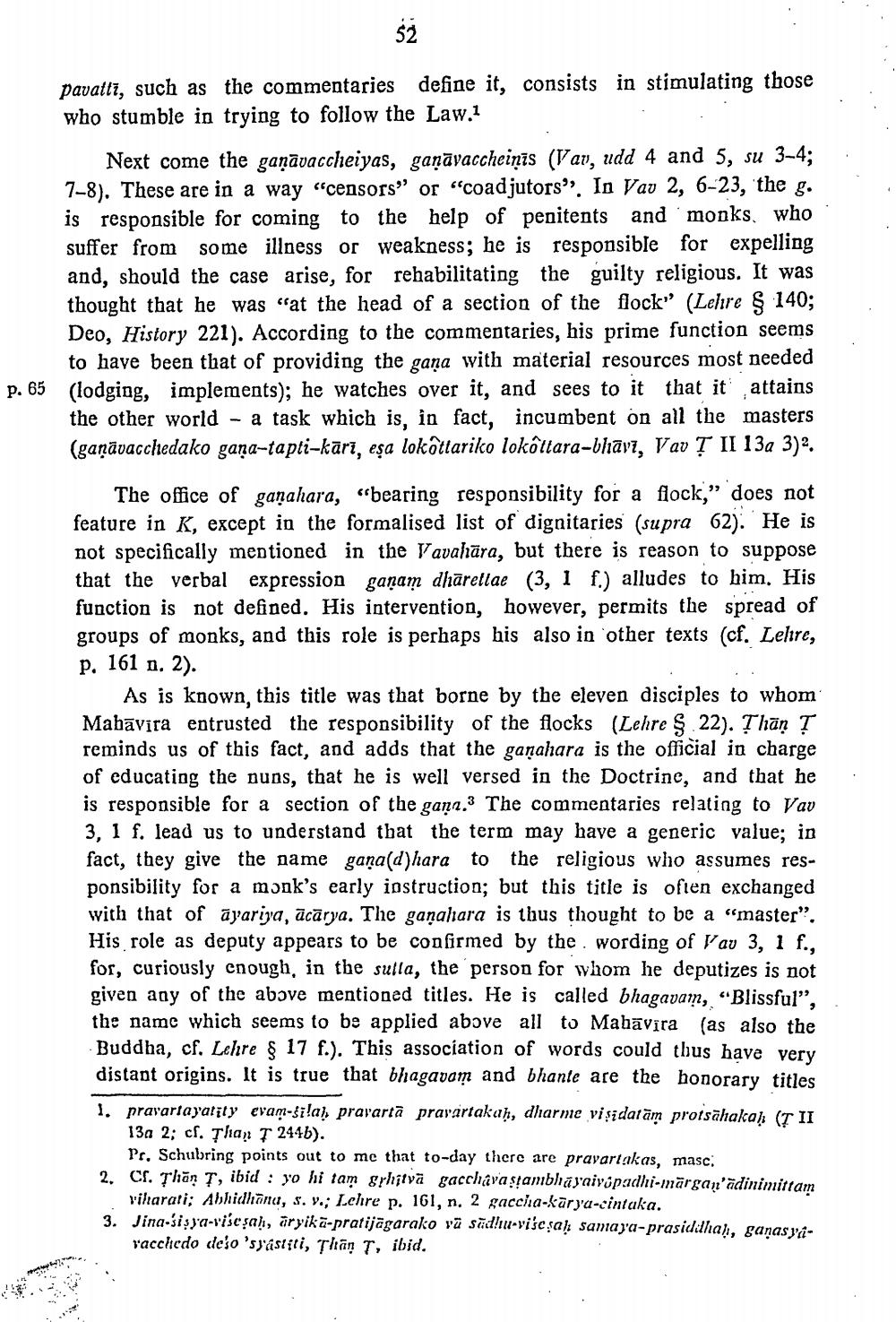________________
pavattī, such as the commentaries define it, consists in stimulating those who stumble in trying to follow the Law.2
Next come the gaṇāvaccheiyas, gañāvaccheinīs (Vav, udd 4 and 5, su 3-4; 7-8). These are in a way “censors” or “coadjutors”. In Vav 2, 6-23, the g. is responsible for coming to the help of penitents and monks, who suffer from some illness or weakness; he is responsible for expelling and, should the case arise, for rehabilitating the guilty religious. It was thought that he was “at the head of a section of the flock” (Lehre $ 140; Deo, History 221). According to the commentaries, his prime function seems to have been that of providing the gana with material resources most needed (lodging, implements); he watches over it, and sees to it that itattains the other world - a task which is, in fact, incumbent on all the masters (gaņāvacchedako gana-tapti-kāri, eșa lokôtlariko lokôltara-blāvi, Vav Ţ II 13a 3)2.
p. 65
The office of ganahara, “bearing responsibility for a flock," does not feature in K, except in the formalised list of dignitaries (supra 62). He is not specifically mentioned in the Vavahāra, but there is reason to that the verbal expression ganam dhārellae (3,1 f.) alludes to him. His function is not defined. His intervention, however, permits the spread of groups of monks, and this role is perhaps his also in other texts (cf. Lelre, p. 161 n. 2).
As is known, this title was that borne by the eleven disciples to whom Mahavira entrusted the responsibility of the flocks (Lehre S22). Thăn T reminds us of this fact, and adds that the ganahara is the official in charge of educating the nuns, that he is well versed in the Doctrine, and that he is responsible for a section of the gang.3 The commentaries relating to Vav 3, 1 f. lead us to understand that the term may have a generic value; in fact, they give the name gaña(d)hara to the religious who assumes responsibility for a monk's early iostruction; but this title is often exchanged with that of a yariya, ācārya. The ganahara is thus thought to be a "master". His role as deputy appears to be confirmed by the wording of Vav 3, 1 f., for, curiously cnough, in the sulla, the person for whom he deputizes is not given any of the above mentioned titles. He is called bhagavam, "Blissful", the name which seems to be applied above all to Mahāvīra (as also the Buddha, cf. Lehre & 17 f.). This association of words could thus have very distant origins. It is true that bhagavom and bhanle are the honorary titles
bubring points
1. pravartayatity evam-silah pravartā pravartakaḥ, dharme vișidatām protsähakal (T II
13a 2; cf. Țhan 7 2446).
Pr, Schubring points out to me that to-day there are pravartakas, masc: 2. Cr. Thăn T, ibid : yo hi tam srhitva gacchava stambhavaivopadli-märgan'adinimittam
viharati; Abhidhānu, s. y.; Lehre p. 161, n. 2 gaccha-kārya-cintaka. 3. Jina-sisya-visesan, öryika-pratijägarako ya sad!u-viscsak samaya-prasiddha), ganas ya
racchedo de'o 'syastiti, Thân T, ibid.
hitam grhu 161, n. 2 gace




